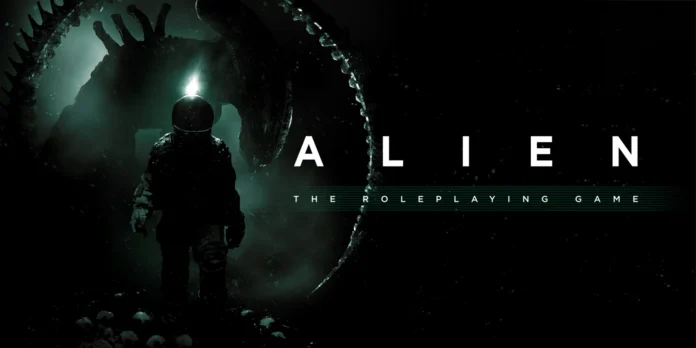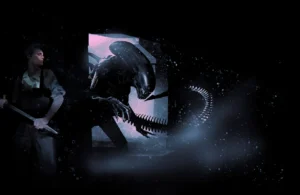Movie tie-ins of any game product can be a dubious prospect, usually little more than cash grabs trying to ride the popularity of something before its time in the sun passes or trying to garner approval just by name association alone.
Thankfully Alien: The Roleplaying Game is not one of those products.
Produced by Sweden based company Free League Publishing and released in December of 2019, Alien: The Roleplaying Game is a 392 page, beautifully illustrated tome that has some of the best examples of ludonarrative synergy found in any tie in property.
An amended version of Free League’s in-house Year Zero Engine forms the underlying mechanics of the game. There are 4 Attributes: Wits, Strength, Agility, and Empathy, and there are also 12 skills, 3 associated with each attribute: Heavy Machinery, Close Combat, and Stamina are associated with Strength, Command, Manipulation, and Medical Aid are associated with Empathy, and so on.
At its core, Alien is a skill plus attribute dice pool system: characters assemble a pool of six sided dice equal to their combined relevant skill plus attribute (for example, 3 Wits plus 2 Observation would equal a pool of 5 d6s). Generally, simply turning up a 6 on any one of their dice is sufficient to pass most tests. Bonuses or penalties from environmental factors are worked in as adding or taking away dice from the pool.
It’s a fairly simple system, which is very much to the game’s strength.
Character creation is archetypal, modeled after the established and iconic roles of the characters in the franchise: Colonial Marines are, naturally, present, as are Corporate Execs, Medics, and Kids (modeled after Newt, of course). Each career has a key attribute associated with it which can be raised higher than the others, some key skills, and access to specific Talents.
Characters also pick a Buddy and a Rival from among the other characters, and are encouraged to play into those relationships. Characters also have a Personal Agenda, which varies slightly depending on the mode of play (more on that below).
Where this game sings, and where it leans into the tone of its inspiration, is the Stress system. When characters encounter the terrors of deep space, alien monstrosities, or generally encounter fraught and dangerous situations and events, they gain Stress Dice: these are extra dice added to their pool that count towards success… but rolling 1 on any of them immediately triggers the character to panic, reacting irrationally or not reacting at all in catatonic terror. Thinking back to the original Alien movies, this fits perfectly: tension rising and rising until the inevitable horrific climax. Arguably there’s some realism to it as well, as we do tend to operate better when circumstances require us to. But no one can be resilient forever, everyone breaks eventually. The effectiveness of this mechanic cannot be overstated, as it naturally feeds into the narrative loop and has the players engaging in high risk, high reward play at crunch moments.
The game bills itself as supporting two distinct modes of play: cinematic mode and campaign mode. Campaign mode is, much as you’d expect, play geared towards longer form campaigns, as with many other games. Cinematic mode is more designed for one shots, and in honesty more closely resembles what an Alien story is likely to be about: deadly for most of the human characters involved, brief, and violent. In cinematic scenarios, characters come with a Personal Agenda already supplied, but in Cinematic they can instead take one of those suggested by their Career, or make one up themselves. Where Alien can differ from other games is that these Personal Agendas do not have to play nicely with the other characters; while player versus player isn’t necessarily built in, it also isn’t discouraged, which admittedly can put some people off. But, again, consider the source material and what kind of stories are told in this universe.
That’s not to say there isn’t proper support for campaign play, with sub-systems for ship to ship combat, travel, and the other kinds of things you’d expect the characters to be engaging with in a space based setting.
The issue with campaign play is a matter of pacing; if you’re whipping out the Giger horrors every session, then besides a concurrent high character turnover rate, it’s going to lose what makes it impactful, like overuse of anything.
Combat is, unsurprisingly, absolutely deadly, especially when aliens themselves are involved: from the lowliest facehugger right up to a queen, each stage of the perfect organism has at least one guaranteed instant kill move in its repertoire; this is offset by the fact that the GM (Game Mother in this setting, as in the ship’s central computer in the first Alien movie) rolls a d6 to randomly determine what actions the alien takes.
This is very definitely a horror game, and thus needs that necessary player buy in, but if you have a group who’re willing to give it a shot and who can lean into the sort of horror tropes this setting implies, then it’s an extremely fun, well-crafted game that has a ruleset firmly pushing the fiction forward. It’s especially well-crafted for one shots that are likely to result in most of the party dying, so could make a fun, one off Halloween game if your group doesn’t usually do horror.
If I had to criticise anything, and bear in mind this is me specifically trying to maintain some vague sense of balance, it’d be that there probably aren’t a whole lot of varieties on the type of games you can play with this system… though really, why would you pick it up if you didn’t have a fairly specific idea of game type in mind? And additionally, while utterly beautiful, I find some of the page layout occasionally feels like it’s wasteful with space, and you could shave off about 20-50 pages if the layout had better use of page space. But this is incredibly minor.
Highly recommended, and well worth the price of approximately £19 (depending on current currency conversion rates) for PDF at Drivethrurpg.com, and £46 for full colour, illustrated hardback print. However, it’s worth noting that a second edition (which sounds more like an efficiency revision than a full on change of rules) was announced in August 2024, the 5th anniversary of the game line’s launch, likely due to the impact made by the release of Alien: Romulus in cinemas. Whether you decide to pick it up now, or wait until the release of the second edition, Alien: TRPG is an excellent example of ludonarrative synergy.
Help keep news FREE for our readers
Supporting your local community newspaper/online news outlet is crucial now more than ever. If you believe in independent journalism, then consider making a valuable contribution by making a one-time or monthly donation. We operate in rural areas where providing unbiased news can be challenging. Read More About Supporting The West Wales Chronicle






















